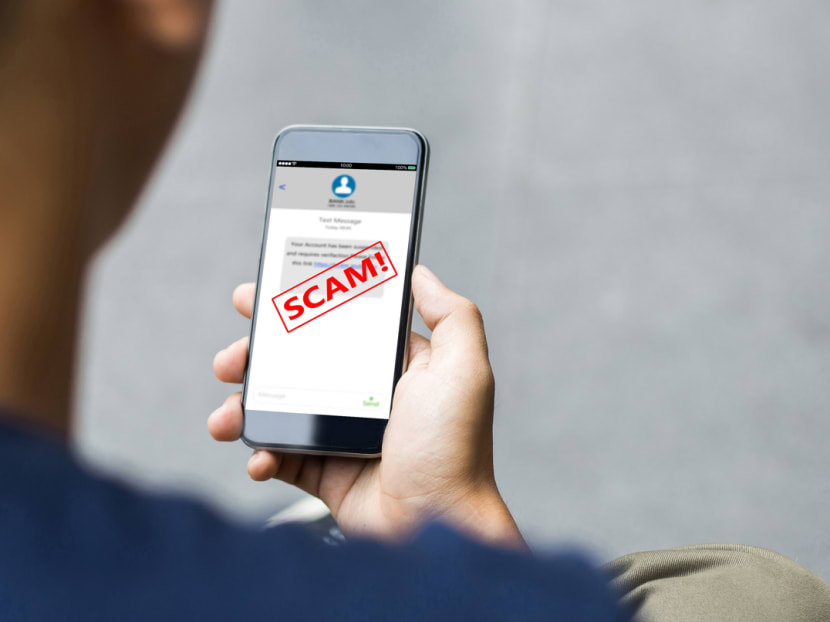Analysis: What proposed new laws cracking down on syndicated scams, money mules could entail
SINGAPORE — Making the act of handing over one’s Singpass details a criminal offence is one possible way that the Government could strengthen the law to make it easier to catch money mules.

- The law will be tightened in Singapore so that money mules can be held criminally liable for their actions
- Lawyers said that the challenge in prosecuting money mules is proving that they knew about the intended crime
- The new legislation will be introduced later in 2023 to better tackle crimes committed in cyberspace
- It could require internet service providers and social media platforms to actively monitor and take down offending content, one lawyer said
SINGAPORE — Making the act of handing over one’s Singpass details a criminal offence is one possible way that the Government could strengthen the law to make it easier to catch money mules.
This was a suggestion raised by one of the lawyers who spoke to TODAY about the upcoming legislative move announced by the Ministry of Home Affairs (MHA).
Others suggested legislating a list of activities that would be presumed to entail money laundering, leaving the suspected money mule with the onus of proving that this was not the case.
Ms Sun Xueling, Minister of State for Home Affairs, said in Parliament on Monday (Feb 27) that the law will be tightened so that money mules can be held criminally liable for their conduct.
Money mules assist scammers to launder their criminal proceeds by, for example, carrying out transactions to transfer the ill-gotten gains through their bank accounts in a manner that may appear to be legitimate.
There have been cases of people giving up their Singpass details for money laundering activities. Singpass is the national identity authentication system that allows users to verify their identity when they log in or sign up to use digital services by the Government or private sector organisations.
Also on Monday, Mrs Josephine Teo, Second Minister for Home Affairs, said that MHA will table legislation later this year to better tackle crimes committed in cyberspace, including the operation of syndicates organising scams.
If passed, the proposed Online Criminal Harms Act will grant the Government powers to stop or remove online communications that facilitate crimes in the physical world, such as inciting violence.
It will "build on our current laws" by increasing the scope of entities the Government can act against, introduce levers that deal more effectively with the nature of online criminal harm, as well as expanding the scope of regulatory levers that are applied to online criminal activities, Mrs Teo said.
In response to TODAY's request for more details, MHA said that the scale and pace of online scams are "vastly different" from crimes in the physical world.
"Scam syndicates run scam operations centres to enhance scam attack vectors and execute their scams with industrial efficiency," MHA said.
To deal with this, the new Act will enable a more proactive approach to stop online criminal activities. For example, a direction can be issued to proactively block websites assessed to be under the control of scam syndicates.
The ministry is also considering upstream requirements such as safeguards against inauthentic accounts to detect and reduce scams and other malicious cyberactivities such as phishing.
Mrs Teo on Monday also said that the Act is aimed at closing the gaps left by the Protection from Online Falsehoods and Manipulation Act (Pofma), which came into force in 2019, the Foreign Interference (Countermeasures) Act (Fica) that was passed in Parliament in 2021 as well as the Broadcasting Act.
So what are the gaps in Singapore's laws now and how might these new legislative measures seek to close them? TODAY spoke to lawyers to find out.
MONEY MULES DIFFICULT TO PROSECUTE
In Parliament, Ms Sun said that the "vast majority" of money mule investigations do not result in prosecution.
"Based on current laws, we need to prove that the money mule knew that the monies he was handling were linked to criminal activity," she said.
She added that the amended Corruption, Drug Trafficking and Other Serious Crimes (Confiscation of Benefits) Act would set out specific conduct for which money mules could be held liable although she did not give details.
Lawyers told TODAY that proving that money mules knew that the monies in question were linked to criminal activity is difficult because such knowledge must be inferred, as opposed to hard evidence such as closed-circuit television footage.
Mr Cory Wong, the director of Invictus Law Corporation, said that there have been instances where the transfer of criminal proceeds is done in an apparently legitimate manner under the guise of an employment contract or even love.
In these cases, the money mule would be able to give a reasonable explanation for being involved.
This makes it difficult to prove that he or she knew or suspected that the money they helped to transfer was connected to criminal activity, Mr Wong added.
HOW CAN THE LAW BE CHANGED?
In order to address these gaps, criminal lawyer Mark Yeo of Kalco Law LLC said that the Government could provide a list of activities that would “trigger a presumption” that the accused knew or had reason to believe that he was involved in money laundering.
It would then fall on the accused person to prove otherwise.
Mr Adrian Wee, director of Characterist LLC, cited the Misuse of Drugs Act as an example in current laws where the usual burden of proof is reversed.
For instance, if the police found a packet of drugs at a person’s house, he or she is presumed to possess that drug, and to have known that it was a prohibited drug, unless the person can prove otherwise.
Associate Professor Ferlin Jayatissa of the Singapore University of Social Sciences said that in the case of prosecuting money mules, the presumption could require anyone about to offer their personal banking details to question the purpose for doing so.
So as long as a person hands over bank account or Singpass details, he or she could be presumed to know that it would be used for money laundering, he suggested.
Mr Yeo of Kalco Law said that one difficulty in setting out a list of activities presumed to entail money laundering is ensuring that the list is broad enough to capture the most common scenarios involving money mules, but not so broad that it would inadvertently include people who are legitimately transacting online.
“With their statistics in hand on what are the most common acts that elude prosecution, Parliament can then tailor-make standalone offences specific to such acts alongside the existing offences to tighten the gaps.Mr Cory Wong, the director of Invictus Law Corporation”
For his part, Mr Wong from Invictus Law Corporation said that he welcomed the proposal to list certain factual scenarios as constituting money-laundering or assisting in money-laundering.
“With their statistics in hand on what are the most common acts that elude prosecution, Parliament can then tailor-make standalone offences specific to such acts alongside the existing offences to tighten the gaps.”
For instance, there could even be a Singpass-specific offence, where handing over one's Singpass details could become an offence, Mr Wong added.
GAPS IN ONLINE HARM LAWS
Under current laws, examples of “online criminal harm” include content that advocates or instructs on self-harm, content intended to wound racial or religious feelings as well as content that advocates terrorism.
However, Mrs Teo said that current laws do not cover conduct that is “criminal in its own right” such as scams, online incitement of mass public disorder and phishing.
Mr Yeo of Kalco Law said that the storming of the United States Capitol on in January 2021 is an extreme example of the type of harm that this Act may be trying to tackle.
Supporters of former US president Donald Trump had used Facebook, Telegram and Instagram to incite a violent mob, in an attempt to force Congress to reverse Mr Trump's election loss.
On the gaps in current laws, Assoc Prof Jayatissa said that Pofma does not specifically deal with content that promotes or incites danger, violence or crimes from which “users need to be more immediately protected”.
Instead, the law addresses false statements of fact that have been or are being communicated in Singapore through the internet.
Similarly, he said that Fica gives authorities the power to investigate and deal with individuals suspected of being foreign agents engaged in “hostile information campaigns”.
It specifically deals with "political interference", he added.
Mr Chenthil Kumarasingam of Withers KhattarWong LLP said that cybercrimes may be caught by the Penal Code under provisions that prohibit cheating, extortion and illegally obtaining personal information.
“However, these provisions were crafted some time ago and may not be sufficiently nuanced to address the intricacies of cybercrime today,” he said.
Giving an example, Mr Chenthil said that when a scam syndicate decides to conduct a scam, those involved may create inauthentic accounts, craft their scam message, circulate the message and so on.
However, if the authorities do not have clear unequivocal evidence of the intended scam, catching them “too early” may mean that it is not possible to prove an offence under the existing Penal Code provisions, he added.
HOW CAN THESE GAPS BE CLOSED?
One way that the Government could reduce the incidence of online harm proliferating is to tighten the conditions for obtaining broadcasting licences, Mr Yeo said.
Entities that the law might want to reach may include companies that host websites such as Amazon Web Services or email servers from which scam emails may be generated, he added.
Mr Yeo pointed out that the Online Safety (Miscellaneous Amendments) Act, passed in November last year, is more focused on regulating social media companies and internet service providers.
Another way would be to require internet service providers and social media platforms to actively monitor and take down offending content.
For now, the regime is more “reactionary in nature”. This means that the Government would issue take-down notices or blocking directions to these companies that would have to comply with such directions, Mr Yeo said.
Mr Chenthil said that the Government could also specify the different forms of cybercrime such as phishing, distribution of malware and online scams, and identify the specific “ingredients” for each crime.
Assoc Prof Jayatissa said that the new law should give investigating agencies the power to investigate, apprehend and curtail the actions of entities within Singapore that engage or encourage criminal enterprise or promote the various categories of online harm.
These entities could include individuals, syndicates or platforms.
"For example, if you incite violence or religious disharmony, (the authorities) can go after you online the same way they can go after a person doing the same with a placard," he added.











